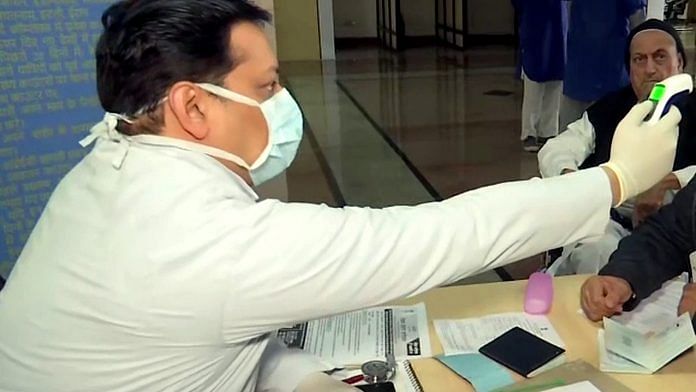Chandigarh: The sudden Covid-19 curfew imposed in Punjab on 23 March, two days before the national lockdown, has stoked chaos among 3.6 lakh registered drug addicts in the state who are on alternative drug therapy and have to visit de-addiction centres daily to get their medicine.
These patients are undergoing treatment at over 250 government and private de-addiction centres.
Doctors and health officials tending to the addicts say the travel restrictions are restricting movement, and point out that the de-addiction clinics open for only a few hours every morning, leading to crowding on the premises, which is a Covid-19 infection hazard.
After these problems were pointed out, the state government stepped in to help by announcing that patients be equipped with two weeks’ dosage, but doctors say this may prove counter-intuitive.
Under alternative drug therapy, addicts looking to kick lethal opioids such as heroin are given a drug that has the same impact on their mind but without any significant side-effects.
The Punjab centres offer a combination of Buprenorphine and Naloxone in varying doses, and the drug is supplied through a single dedicated supply line monitored by the state’s health department. The drug is only available at these centres, and its sale by chemist shops is banned.
Once on alternative therapy, the addict has to be gradually weaned off it.
Also Read: More than half of Punjab’s prison inmates involved in drugs cases, says jails minister
Daily movement affected
With the medicine supply strictly controlled, patients who are registered at these centres have to visit the clinic every day for daily doses. The curfew has, however, made matters difficult, according to doctors and health professionals.
Although the government has allowed drug addicts with valid OPD cards to travel during the curfew, some patients have been scared to stir out amid reports of police violence, the doctors say. The fact that the clinics are being opened only for a few hours in the morning has further compounded problems, they add.
“This is leading to unnecessary crowding at the centres, which is going to defeat the very purpose of a curfew,” said a senior doctor in charge of a centre in Jalandhar.
“The government has decided that these patients be given a dose that will last them two weeks. But there are several thousands who are still approaching these clinics, queueing up outside the centres,” the doctor added.
The doctor also added that a two-week dose could be misused by the addicts. “They can both share these with non-addicts or consume an overdose. But the government has few other options on how to run the de-addiction centres well, considering the health department is dealing with such a grim situation arising out of the coronavirus outbreak,” the doctor said.
A few months ago, the government started a system where a registered addict could take home a week’s dose. This system was still a work in progress when the curfew was imposed, say personnel handling the de-addiction centres.
“It’s a unique situation… how the curfew will impact these addicts. If it continues for too long, they might fall out of therapy totally, which will be like taking one step forward and two backwards,” said the in-charge of a private centre in Mohali.
Dr P.D. Garg, head of the department of psychiatry at the Amritsar-based Government Medical College added that, initially, only government clinics were empowered to hand out the two-week dosage, which didn’t benefit patients attending private de-addiction centres. However, now the government has allowed private centres to hand out the dose too.
Asked about the steps taken by the government to help these patients, the nodal officer of the Punjab government for drug de-addiction, Dr Anu Chopra, reiterated that the government had decided to disburse a two-week dose to patients.
Alternative drug therapy to tackle addiction
When Captain Amarinder Singh of the Congress assumed power in Punjab in 2017, alternative drug therapy was introduced in a big way to tackle rampant drug addiction in the state.
Special oral opioid alternative treatments (OOAT) clinics were set up to supplement the already functional de-addiction and rehabilitation centres.
The OOAT or Out-patient Opioid Assisted Therapy clinics offer alternative therapy in an OPD setting. De-addiction centres also offer inpatient facility, where drug addicts are first admitted for detoxification and later treated in OPDs. Rehabilitation centres are facilities that don’t have a hospital-like environment. Here, drug addicts are counselled and psychologically treated to wean them away from drugs.
According to data shared by the government on 7 March, over 1.15 lakh addicts are being treated at OOAT centres, 2.15 lakh in de-addiction centres and nearly 30,000 in rehabilitation centres.
Also Read: Punjab’s youth is disillusioned & frustrated, Amarinder says on viral drugs tragedy videos




It’s ok. Let’s think logic. Are they, given their value to their immediate family and society, a priority at the current situation? There are more vulnerable groups that need to keep healthy for a healthy society.